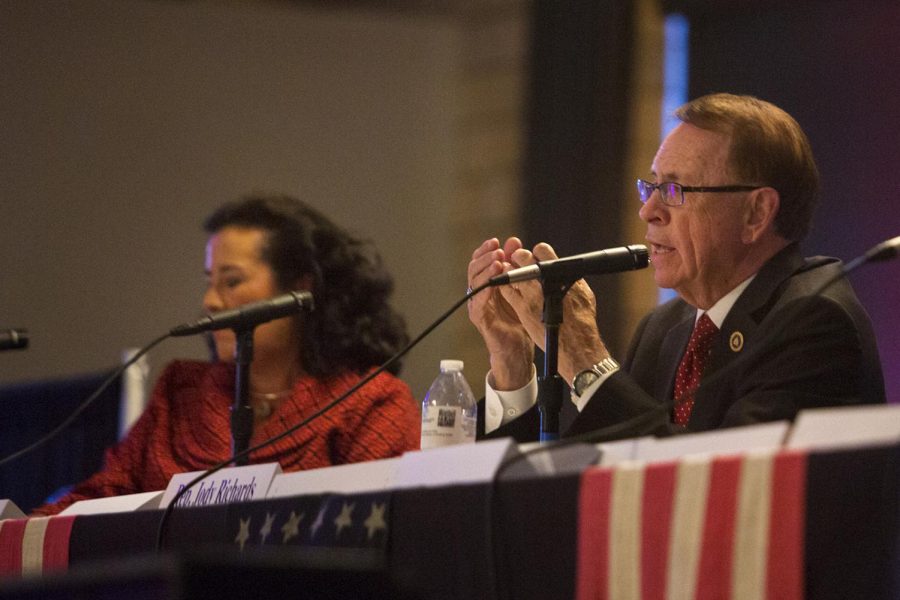Candidates debate local, state issues at public forum
October 26, 2016
Candidates for positions in both the local and state government met on Tuesday night at La Gala in downtown Bowling Green for a public debate.
The “Debate in the District’ was hosted by the Bowling Green Daily News and the Downtown Redevelopment Authority. It included the two candidates for the Kentucky House of Representatives, the two candidates for mayor and 11 candidates for city commissioner.
The two candidates who are competing to represent the 20th district in the House of Representatives are current Bowling Green city commissioner Melinda Hill and Representative Jody Richards. Hill and Richards were the first candidates to take the stage, and their debate focused primarily on the state’s most pressing issues; the pension system for state workers.
Both Hill and Richards agreed the underfunded pension system is the state’s biggest problem at the moment. Hill said the pension system is underfunded by nearly $41 billion and is one of the worst pension systems in the nation. The pension system was one of the main focuses during the 2016 legislative system, and Gov. Matt Bevin chose to make controversial cuts to a wide range of programs including postsecondary education in order to aid the pension system.
Hill said Kentucky should be “ashamed” about the state of the pension system. She said it was wrong to continue to fund the state legislators’ pension while neglecting the pension program for state employees and teachers.
“Our state employees deserve what has been promised to them,” Hill said. “It’s the obligation of the state legislature to make sure they receive what they were promised.”
Hill suggested reexamining and possibly changing the pension system. In the meantime, she said legislators need to stop making the problem worse.
“Kentucky cannot move forward until we address this pension issue,” Hill said.
Richards, who has been a representative since 1976, expressed agreement with Hill’s opinion regarding the pension problem; however, he blamed the problem on a lack of diversified investments. He said the legislature was making its required contribution to the pension system and had given $1.2 billion to the fund in 2016.
To combat the problem, Richards said the general assembly would need to increase transparency and reform the system while continuing to make the required contribution to the fund.
Both candidates discussed how they would prioritize spending in the state’s budget and what cuts they would suggest. Hill said the state spent too much money and needed to make cuts similar to the ones Bevin suggested earlier this year. She defended Bevin’s across the board budget cuts as “decisions that had to be made.”
Richards disagreed with Hill and said the cuts to the universities’ budgets were unnecessary. He said it is important to spend money wisely and aid the pension system; however, he said across the board cuts that include postsecondary education were not a good choice.
After the debate between Richards and Hill, the two candidates for mayor of Bowling Green were invited to the stage to speak briefly about their platforms.
Don Langley, a write-in candidate for mayor, spoke about his support for the Fairness Ordinance. The ordinance, also called the Fairness Amendment, would make it illegal for people to be denied a job, housing or other public accommodations because of their gender identity or sexual orientation. If elected, he promised to vote on the Fairness Ordinance within his first 90 days in office.
Langley also emphasized his support of transparency in government. He criticized his opponent, current Bowling Green mayor Bruce Wilkerson, for holding secret meetings during his time in office.
“If you want a full-time mayor instead of a part-time mayor that we so desperately need, write in Don Langley on election day,” Langley said.
During his allotted two minutes, incumbent Wilkerson spoke about the five years he has served as Bowling Green’s mayor. He described the work he has done with the help of the city commission to increase jobs and how he has done his best to prevent tax increases and reduce debt.
“We’ve been able to grow our budget and still provide those services without raising taxes,” Wilkerson.
The last part of the debate featured 11 out of the 12 candidates for the four open city commissioner positions. Incumbent Joe Denning, who has served as city commissioner for 22 years, did not attend the debate.
All 11 participants were given the opportunity to answer each question. Nearly all of them spoke about their support for expanding transportation services in the city including adding new bus routes.
“If there’s something that we can do to fund and to make our public transportation system more viable in this community, I think that’s work we should do,” incumbent Rick Williams said.
The candidates were more divided when asked about their stance on the Fairness Ordinance. Only five of the 11 candidates said they supported passing the ordinance. Those candidates included Ryan Gene Fulkerson, Andrew Manley, Jennifer Morlan, Nathan Morguelan and Brian ‘Slim’ Nash.
“You either support legal discrimination or bigotry or you don’t,” Fulkerson said. “I’m glad to be against it.”
The candidates were also divided when asked if they supported the Uniform Residential Landlord Tenant Act. URLTA was designed to improve the relationship between landlords and their tenants. It clearly defines the rights for both parties.
Only Fulkerson, Morlan, Manley and Morguelan supported URLTA.
The other candidates for city commissioner include Mark Bradford, incumbent Sue Parrigan, Derek Lee Reeder, Dan Rudloff and Matt Stephens.
Reporter Emma Collins can be reached at 27-745-6011 and [email protected]. Follow her on Twitter at @__emma_collins__.













